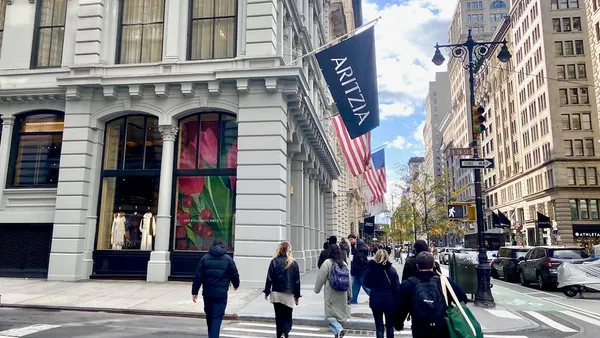Dive Brief:
-
H&M on Tuesday announced that it's begun the process of shuttering its Cheap Monday skinny jeans brand, which it acquired 10 years ago. The closure is expected to be complete by June 30, 2019, with the e-commerce site and the Cheap Monday store in London both closing Dec. 31 this year, according to a company press release.
-
The brand, founded in 2004, was mostly sold through other retailers, and the company said that was no longer working, with "a negative trend in the Cheap Monday's sales and profits for a long time."
-
Some 80 employees in Cheap Monday operations in Tranas and Stockholm, Sweden will be impacted by the closure, the company said. H&M is already working with their unions and plans to end all the employment contracts next year. All will receive career support, including guidance in finding jobs within H&M.
Dive Insight:
H&M spent the first half of the year battling a massive build-up of excess apparel even as it introduced new labels to its fashion stable. Now it's folding one, perhaps none too soon, according to Kate Ormrod, lead retail analyst at GlobalData.
"Something that stands out to me is that H&M states that there's been a negative trend in Cheap Monday's sales and profits 'for a long time,' so it's interesting that the brand is only being axed now – perhaps it could/should have happened earlier," she told Retail Dive in an email. "Obviously ridding itself of a weak brand means it can fully focus on the rest of its portfolio, and clearly there's a lot of potential there with its newer brands, but they just need the investment and room to grow."
Some analysts have worried that those new banners, which include Afound and millennial-focused Nyden, as well as last year's Arket, are too small to have much impact on sales. H&M Group's Head of New Business, Anna Attemark, defended the newer brands in a statement. "We need to constantly develop our business and what we choose to invest in. We see very good opportunities and great potential for all of the other brands within New Business, which all are developing positively both digitally as well as through physical stores," she said.
It's not clear how much impact shuttering a label that was mostly a wholesaler will have on either its inventory or its sales troubles. But its potential is hardly poised to grow. "While Cheap Monday sells via the likes of ASOS, Urban Outfitters, Selfridges, House of Fraser and Amazon in the UK, there is so much more competition now in terms of denim brands – not least from retailers' private label ranges," Ormrod said. "It's the right decision to axe the brand if it doesn't have sufficient brand appeal and point of difference to stand out from competitors and thrive."
Ditching wholesale to focus on brands tailored to particular customer segments makes sense, especially in light of the company's recent push to leverage data, according to Corey Pierson, co-founder and CEO of marketing analytics platform Custora. "The traditional form of retail is very product-first thinking — 'How are our products trending this year?' — but now it's all about 'Who are these customers? What do the customers, the ones fueling growth in our brand, want to buy? What are your key customer segments buying this year?'" he told Retail Dive in an interview. "Some are trendsetters that buy full price, others wait for your sales. I suspect that is exactly what H&M is doing."
Data is key to answering those questions, Pierson also said. The company earlier this year was reportedly experimenting with using big data and AI in flagship stores to customize assortments at individual locations, and its venture capital arm H&M CO:LAB invested $13 million last month in Thread, an e-commerce startup specializing in personalized menswear styling.














